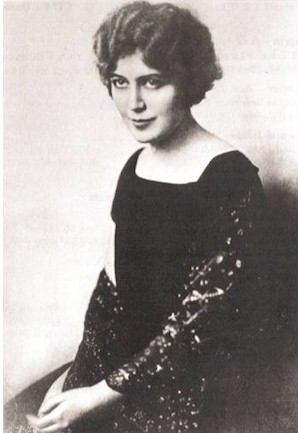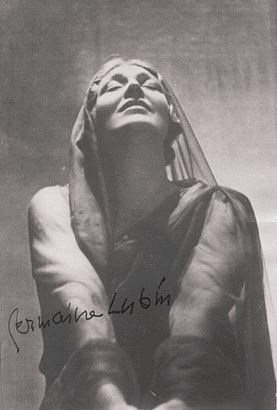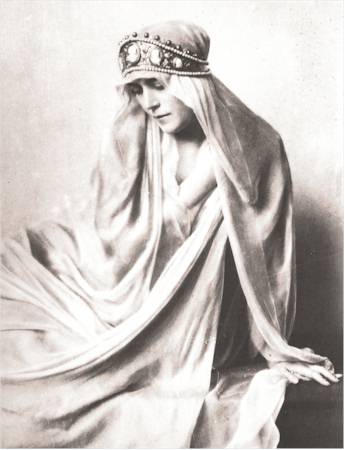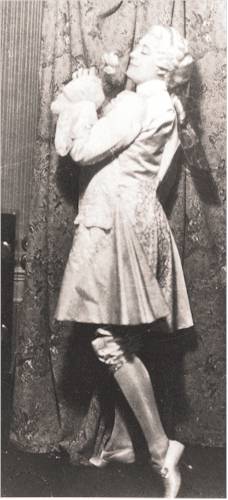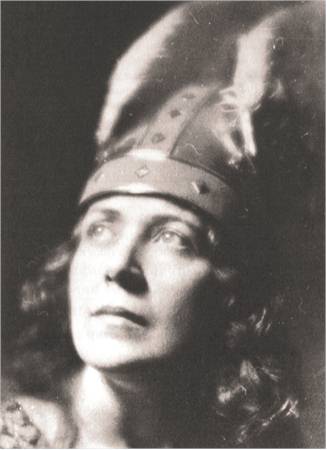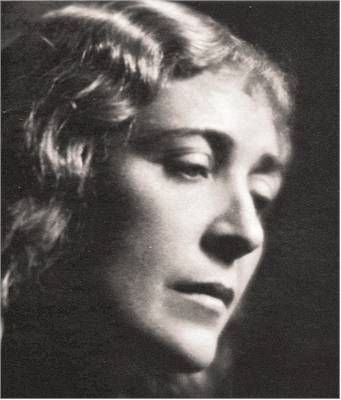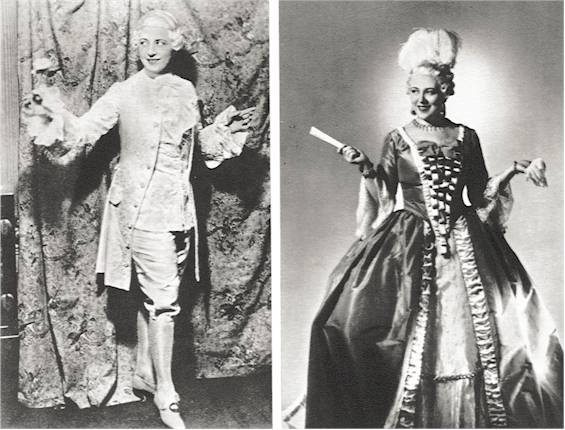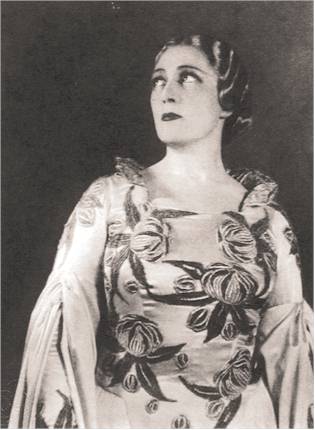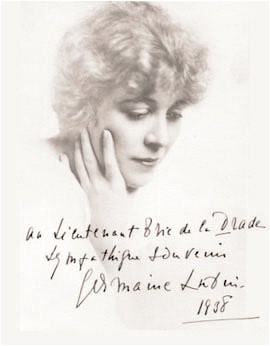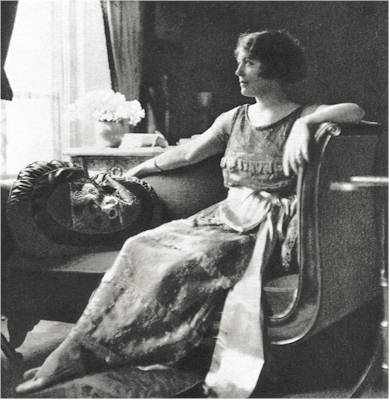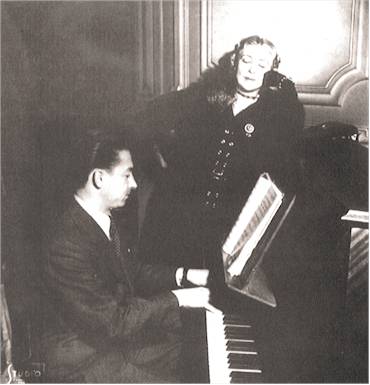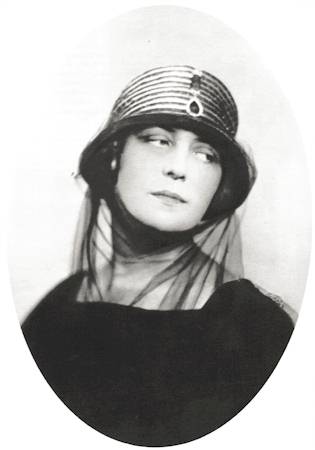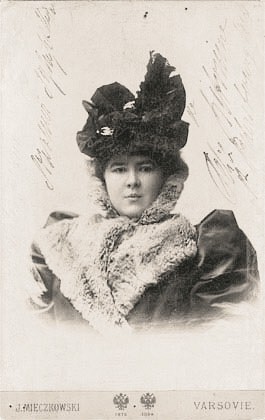French soprano, 1890 - 1979
“I am a quarter Polish, a quarter Arab and half Alsatian” Biographical notes:
She studied at the Paris Conservatoire with Félia Litvinne, later with Lilli Lehmann (Donna Anna and Isolde) and Marie Gutheil-Schoder (Elektra). In her view Jean de Reszke had taught her
very little! In 1912 she made her debut as Antonia in Les Contes d’Hoffmann at the Opéra-Comique where Albert Carré gave her the opportunity to appear as Ariadne, Pénélope,
Charlotte and Louise. She became the most admired dramatic soprano for more than 20 years at the Grand Opéra where she sang in a varied repertory, including Juliette (!), Thaïs, Marguerite
(Boito and Gounod), Aida and Sallambô (Reyer). She appeared as Agathe, Fidelio, Elsa, Eva, Elisabeth, Sieglinde, Brünnhilde, Isolde, Elektra and Cassandre in Berlioz’ Les Troyens. It was
Lubin who sang the first French performances of Strauss’ Ariadne auf Naxos, Der Rosenkavalier and Elektra. She also created roles in new operas, such as Nicéa in d’Indy’s La Légende de Saint
Christophe (1920), Empress Charlotte in Milhaud’s Maximilien (1932) and the Countess Sanseverina in Sauguet’s La Chartreuse de Parme. Because of the outbreak of war she did not
succeed to sing at the Met although Kirsten Flagstad recommended her to go there. Her most celebrated roles were probably Alceste and Iphigénie en Aulide (Gluck), Telaira in Rameau’s
Castor et Pollux (1935) and Ariane in Dukas’ Ariane et Barbe-Bleu (1937). She was a beautiful and tall woman. Her statuesque appearance in these roles proclaimed her as a classic artist in the
grand manner. Lubin’s friendship with the Wagner family and her sympathy with Germany brought her career to an abrupt end in 1944 during the German occupation of Paris. After three years in
prison she reappeared in a few recitals in 1952. After the death of her son in 1954 she never sang in public again and eventually became a teacher at the Paris Conservatoire.
As Isolde
In the title role of Strauss’ “Ariadne auf Naxos”
As Octavian (1927)
As Brünnhilde
As Isolde
Much admired by Richard Strauss - as Octavian and as Marschallin
In the title role of Dukas’ “Ariane et Barbe-Bleue” Comment: Germaine Lubin, Suzanne Balguerie and Régine Crespin have been the only valuable successors of the two French dramatic (Wagnerian) sopranos, Félia Litvinne and Lucienne Bréval.
Germaine Lubin is one of my favorite dramatic sopranos because her singing in Wagner reminds me of the style delivered by
Not yet released are some broadcasts of Tristan (conducted by de Sabata), Dukas’ Ariane et Barbe-Bleue and Gluck’s Alceste.
My favorite recordings: Wagner excerpts mostly sung in French - Einsam in trüben Tagen (Elsa in Lohengrin / Wagner / Odeon 1929) - Dich, teure Halle grüss’ ich wieder (Elisabeth in Tannhäuser / Wagner / Odeon 1929) - Allmächt’ge Jungfrau hör’ mein Flehen (Elisabeth in Tannhäuser / Wagner / Odeon 1929) - Mild und leise (Isolde in Tristan und Isolde / Wagner / Odeon 1929) - Ewig war ich (Brünnhilde in Siegfried / Wagner / Odeon 1929) - Starke Scheite schichtet mir dort auf (Brünnhilde in Götterdämmerung / Wagner / Odeon 1929) - Ein Fremder trat da herein with René Verdière (Sieglinde in Die Walküre / Wagner / Odeon 1930)
- Vissi d’arte (Title role in Tosca / Puccini / Odeon 1930) - Tristesse (arranged by Lubin’s teacher Félia Litvinne after Chopin’s Etude op. 10 No. 3 / Odeon 1930) - Der Erlkönig in German (Schubert / Pathé 1939) - Au bord de l’eau (Fauré / 1944) - Nun wand’re Maria in German (Wolf / 1954)
Herbert von
Karajan and Germaine Lubin, Paris 1941
Germaine Lubin in her own words: “I have suffered an enormous injustice. They curtailed my career by ten years - my own people! The fact is that I knew some of the Germans when they came to Paris during the occupation. This gave my enemies the chance to satisfy their envy...If I saw the Germans in Paris - and they had been more than kind to me - it was to save my compratriots. It was my way of serving my country at that particular moment. Nobody knows how many prisoners I had released...When I spent three years in prison, they confiscated my château at Tours and my possessions. Did anyone bother to ask me why I did not accept Winifred Wagner’s invitations to sing in Germany during the occupation? But my trial was a complete vindication: I was completely cleared. Yes, they gave back most of what they had taken...” “Lubin Revisited” by Max de Schauensee
Félia Litvinne (1860 - 1936) Germaine Lubin was full of admiration for her teacher who had studied with Pauline Viardot-García and Victor Maurel
|
||||||||||||||||||||||||||||||||||||||||
